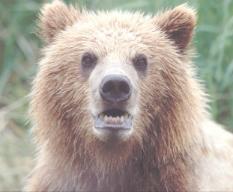
Did you know that bears are an umbrella species? The health of a bear population is a reflection of the health of the ecosystem in which they live. Did you know that bears hibernate throughout the winter? Talk about a good nights sleep! Did you know that bears have stopped hibernating in the mountains of northern Spain? This may be one of the strongest signals yet of how much climate change is affecting the natural world.
In a December in which bumblebees, butterflies and even swallows have been on the wing in Britain, European brown bears have been lumbering through the forests of Spain's Cantabrian mountains, when normally they would already be in their long, annual sleep.
Bears are supposed to slumber throughout the winter, slowing their body rhythms to a minimum and drawing on stored resources, because frozen weather makes food too scarce to find. The barely breathing creatures can lose up to 40 per cent of their body weight before warmer springtime weather rouses them back to life.
Please Click here to read the complete article.
Why do we care about sleeping bears? Besides the fact that we might globally warm ourselves right out of existence, unlocking the secrets of hibernating grizzlies may help people live longer and stay healthier.
Mike Stark writes in the Billings Gazette that researchers for years have been trying to understand how the bears survive such a long, slothful period without suffering lasting ill effects.
In particular, scientists are looking at what the napping bears can teach about staving off heart disease, extending the viability of transplant organs and maintaining muscle tone in bedridden patients or astronauts in space.
Much of the research is happening at Washington State University, where 10 captive grizzly bears, some of them from the Northern Rockies, are studied year-round.
